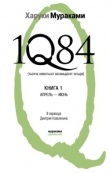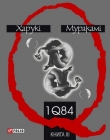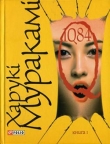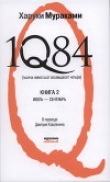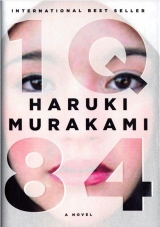
Текст книги "1q84"
Автор книги: Haruki Murakami
Жанр:
Современная проза
сообщить о нарушении
Текущая страница: 9 (всего у книги 81 страниц)
“Did I keep you waiting?” Tengo asked.
Fuka-Eri glanced at him and shook her head a centimeter or two from side to side. Her black eyes had a fresh, silken luster but, as before, no perceptible expression. She looked as though she did not want to speak with anyone for the moment, so Tengo gave up on any attempt to keep up a conversation and sat beside her on the bench, saying nothing.
When the train came, Fuka-Eri stood up, and the two of them boarded together. There were few passengers on the weekend rapid-service train, which went all the way out to the mountains of Takao. Tengo and Fuka-Eri sat next to each other, silently watching the cityscape pass the windows on the other side. Fuka-Eri said nothing, as usual, so Tengo kept silent as well. She tugged the collar of her cardigan closed as if preparing for a wave of bitter cold to come, looking straight ahead with her lips drawn into a perfectly straight line.
Tengo took out a small paperback he had brought along and started to read, but after some hesitation he stopped reading. Returning the book to his pocket, he folded his hands on his knees and stared straight ahead, adopting Fuka-Eri’s pose as if to keep her company. He considered using the time to think, but he couldn’t think of anything to think about. Because he had been concentrating on the rewrite of Air Chrysalis, it seemed, his mind refused to form any coherent thoughts. At the core of his brain was a mass of tangled threads.
Tengo watched the scenery streaming past the window and listened to the monotonous sound of the rails. The Chuo Line stretched on and on straight westward, as if following a line drawn on the map with a ruler. In fact, “as if” was probably unnecessary: they must have done just that when they laid it out a hundred years earlier. In this part of the Kanto Plain there was not a single topographical obstruction worth mentioning, which led to the building of a line without a perceivable curve, rise, or fall, and no bridges or tunnels. All they needed back then was a ruler, and all the trains did now was run in a perfectly straight line to the mountains out west.
At some point, Tengo fell asleep. When the swaying of the train woke him, they were slowing down for the stop in Ogikubo Station, no more than ten minutes out of Shinjuku—a short nap. Fuka-Eri was sitting in the same position, staring straight ahead. Tengo had no idea what she was, in fact, looking at. Judging from her air of concentration, she had no intention of getting off the train for some time yet.
“What kind of books do you read?” Tengo asked Fuka-Eri when they had gone another ten minutes and were past Mitaka. He raised the question not only out of sheer boredom but because he had been meaning to ask her about her reading habits.
Fuka-Eri glanced at him and faced forward again. “I don’t read books,” she answered simply.
“At all?”
She gave him a quick nod.
“Are you just not interested in reading books?” he asked.
“It takes time,” she said.
“You don’t read books because it takes time?” he asked, not quite sure he was understanding her properly.
Fuka-Eri kept facing forward and offered no reply. Her posture seemed to convey the message that she had no intention of negating his suggestion.
Generally speaking, of course, it does take some time to read a book. It’s different from watching television, say, or reading manga. The reading of a book is an activity that involves some continuity; it is carried out over a relatively long time frame. But in Fuka-Eri’s statement that “it takes time,” there seemed to be included a nuance somewhat different from such generalities.
“When you say, ‘It takes time,’ do you mean … it takes a lot of time?” Tengo asked.
“A lot,” Fuka-Eri declared.
“A lot longer than most people?”
Fuka-Eri gave him a sharp nod.
“That must be a problem in school, too. I’m sure you have to read a lot of books for your classes.”
“I just fake it,” she said coolly.
Somewhere in his head, Tengo heard an ominous knock. He wished he could ignore it, but that was out of the question. He had to know the truth.
“Could what you’re talking about be what they call ‘dyslexia’?” he asked.
“Dyslexia.”
“A learning disability. It means you have trouble making out characters on a page.”
“They have mentioned that. Dys—”
“Who mentioned that?”
She gave a little shrug.
“In other words,” Tengo went on, searching for the right way to say it, “is this something you’ve had since you were little?”
Fuka-Eri nodded.
“So that explains why you’ve hardly read any novels.”
“By myself,” she said.
This also explained why her writing was free of the influence of any established authors. It made perfect sense.
“You didn’t read them ‘by yourself,’ ” Tengo said.
“Somebody read them to me.”
“Your father, say, or your mother read books aloud to you?”
Fuka-Eri did not reply to this.
“Maybe you can’t read, but you can write just fine, I would think,” Tengo asked with growing apprehension.
Fuka-Eri shook her head. “Writing takes time too.”
“A lot of time?”
Fuka-Eri gave another small shrug. This meant yes.
Tengo shifted his position on the train seat. “Which means, perhaps, that you didn’t write the text of Air Chrysalis by yourself.”
“I didn’t.”
Tengo let a few seconds go by. A few heavy seconds. “So who did write it?”
“Azami,” she said.
“Who’s Azami?”
“Two years younger.”
There was another short gap. “This other girl wrote Air Chrysalis for you.”
Fuka-Eri nodded as though this were an absolutely normal thing.
Tengo set the gears of his mind spinning. “In other words, you dictated the story, and Azami wrote it down. Right?”
“Typed it and printed it,” Fuka-Eri said.
Tengo bit his lip and tried to put in order the few facts that he had been offered so far. Once he had done the rearranging, he said, “In other words, Azami printed the manuscript and sent it in to the magazine as an entry in the new writer’s contest, probably without telling you what she was doing. And she’s the one who gave it the title Air Chrysalis.”
Fuka-Eri cocked her head to one side in a way that signaled neither a clear yes nor a clear no. But she did not contradict him. This probably meant that he generally had the right idea.
“This Azami—is she a friend of yours?”
“Lives with me.”
“She’s your younger sister?”
Fuka-Eri shook her head. “Professor’s daughter.”
“The Professor,” Tengo said. “Are you saying this Professor also lives with you?”
Fuka-Eri nodded. Why bother to ask something so obvious? she seemed to be saying.
“So the person I’m going to meet now must be this ‘Professor,’ right?”
Fuka-Eri turned toward Tengo and looked at him for a moment as if observing the flow of a distant cloud or considering how best to deal with a slow-learning dog. Then she nodded.
“We are going to meet the Professor,” she said in a voice lacking expression.
This brought their conversation to a tentative end. Again Tengo and Fuka-Eri stopped talking and, side by side, watched the cityscape stream past the train window opposite them. Featureless houses without end stretched across the flat, featureless earth, thrusting numberless TV antennas skyward like so many insects. Had the people living in those houses paid their NHK subscription fees? Tengo often found himself wondering about TV and radio reception fees on Sundays. He didn’t want to think about them, but he had no choice.
Today, on this wonderfully clear mid-April morning, a number of less-than-pleasant facts had come to light. First of all, Fuka-Eri had not written Air Chrysalis herself. If he was to take what she said at face value (and for now he had no reason to think that he should not), Fuka-Eri had merely dictated the story and another girl had written it down. In terms of its production process, it was no different from some of the greatest landmarks in Japanese literary history—the Kojiki, with its legendary history of the ruling dynasty, for example, or the colorful narratives of the warring samurai clans of the twelfth century, The Tale of the Heike. This fact served to lighten somewhat the guilt he felt about modifying the text of Air Chrysalis, but at the same time it made the situation as a whole significantly more complicated.
In addition, Fuka-Eri had a bad case of dyslexia and couldn’t even read a book in the normal way. Tengo mentally reviewed his knowledge of dyslexia. He had attended lectures on the disorder when he was taking teacher training courses in college. A person with dyslexia could, in principle, both read and write. The problem had nothing to do with intelligence. Reading simply took time. The person might have no trouble with a short selection, but the longer the passage, the more difficulty the person’s information processing faculty encountered, until it could no longer keep up. The link between a character and what it stood for was lost. These were the general symptoms of dyslexia. The causes were still not fully understood, but it was not surprising for there to be one or two dyslexic children in any classroom. Einstein had suffered from dyslexia, as had Thomas Edison and Charles Mingus.
Tengo did not know whether people with dyslexia generally experienced the same difficulties in writing as in reading, but it seemed to be the case with Fuka-Eri. One was just as difficult for her as the other.
What would Komatsu say when he found out about this? Tengo caught himself sighing. This seventeen-year-old girl was congenitally dyslexic and could neither read books nor write extended passages. Even when she engaged in conversation, she could only speak one sentence at a time (assuming she was not doing so intentionally). To make someone like this into a professional novelist (even if only for show) was going to be impossible. Even supposing that Tengo succeeded in rewriting Air Chrysalis, that it took the new writers’ prize, and that it was published as a book and praised by the critics, they could not go on deceiving the public forever. It might go well at first, but before long people would begin to think that “something” was “funny.” If the truth came out at that point, everyone involved would be ruined. Tengo’s career as a novelist would be cut short before it had hardly begun.
There was no way they could pull off such a flawed conspiracy. He had felt they were treading on thin ice from the outset, but now he realized that such an expression was far too tepid. The ice was already creaking before they ever stepped on it. The only thing for him to do was go home, call Komatsu, and announce, “I’m withdrawing from the plan. It’s just too dangerous for me.” This was what anyone with any common sense would do.
But when he started thinking about Air Chrysalis, Tengo was split with confusion. As dangerous as Komatsu’s plan might be, he could not possibly stop rewriting the novella at this point. He might have been able to give up on the idea before he started working on it, but that was out of the question now. He was up to his neck in it. He was breathing the air of its world, adapting to its gravity. The story’s essence had permeated every part of him, to the walls of his viscera. Now the story was begging him to rework it: he could feel it pleading with him for help. This was something that only Tengo could do. It was a job well worth doing, a job he simply had to do.
Sitting on the train seat, Tengo closed his eyes and tried to reach some kind of conclusion as to how he should deal with the situation. But no conclusion was forthcoming. No one split with confusion could possibly produce a reasonable conclusion.
“Does Azami take down exactly what you say?” Tengo asked.
“Exactly what I tell her.”
“You speak, and she writes it down.”
“But I have to speak softly”
“Why do you have to speak softly?”
Fuka-Eri looked around the car. It was almost empty. The only other passengers were a mother and her two small children on the opposite seat a short distance away from Tengo and Fuka-Eri. The three of them appeared to be headed for someplace fun. There existed such happy people in the world.
“So they won’t hear me,” Fuka-Eri said quietly.
“ ‘They’?” Tengo asked. Looking at Fuka-Eri’s unfocused eyes, it was clear that she was not talking about the mother and children. She was referring to particular people that she knew well and that Tengo did not know at all. “Who are ‘they’?” Tengo, too, had lowered his voice.
Fuka-Eri said nothing, but a small wrinkle appeared between her brows. Her lips were clamped shut.
“Are ‘they’ the Little People?” Tengo asked.
Still no answer.
“Are ‘they’ somebody who might get mad at you if your story got into print and was released to the public and people started talking about them?”
Fuka-Eri did not answer this question, either. Her eyes were still not focused on any one point. He waited until he was quite sure there would be no answer, and then he asked another question.
“Can you tell me about your ‘Professor’? What’s he like?”
Fuka-Eri gave him a puzzled look, as if to say, What is this person talking about? Then she said, “You will meet the Professor.”
“Yes, of course,” Tengo said. “You’re absolutely right. I’m going to meet him in any case. I should just meet him and decide for myself.”
At Kokubunji Station, a group of elderly people dressed in hiking gear got on. There were ten of them altogether, five men and five women in their late sixties and early seventies. They carried backpacks and wore hats and were chattering away like schoolchildren. All carried water bottles, some strapped to their waists, others tucked in the pockets of their backpacks. Tengo wondered if he could possibly reach that age with such a sense of enjoyment. Then he shook his head. No way. He imagined these old folks standing proudly on some mountaintop, drinking from their water bottles.
In spite of their small size, the Little People drank prodigious amounts of water. They preferred to drink rainwater or water from the nearby stream, rather than tap water. And so the girl would scoop water from the stream during daylight hours and give it to the Little People to drink. Whenever it rained, she would collect water in a bucket because the Little People preferred rainwater to water gathered from the stream. They were therefore grateful for the girl’s kindness.
Tengo noticed he was having trouble staying focused on any one thought. This was not a good sign. He felt an internal confusion starting. An ominous sandstorm was developing somewhere on the plane of his emotions. This often happened on Sundays.
“Is something wrong,” Fuka-Eri asked without a question mark. She seemed able to sense the tension that Tengo was feeling.
“I wonder if I can do it.”
“Do what.”
“If I can say what I need to say.”
“Say what you need to say,” Fuka-Eri asked. She seemed to be having trouble understanding what he meant.
“To the Professor.”
“Say what you need to say to the Professor,” she repeated.
After some hesitation, Tengo confessed. “I keep thinking that things are not going to go smoothly, that everything is going to fall apart,” he said.
Fuka-Eri turned in her seat until she was looking directly at Tengo. “Afraid,” she asked.
“What am I afraid of?” Tengo rephrased her question.
She nodded silently.
“Maybe I’m just afraid of meeting new people. Especially on a Sunday morning.”
“Why Sunday,” Fuka-Eri asked.
Tengo’s armpits started sweating. He felt a suffocating tightness in the chest. Meeting new people and having new things thrust upon him. And having his present existence threatened by them.
“Why Sunday,” Fuka-Eri asked again.
Tengo recalled his boyhood Sundays. After they had walked all day, his father would take him to the restaurant across from the station and tell him to order anything he liked. It was a kind of reward for him, and virtually the only time the frugal pair would eat out. His father would even order a beer (though he almost never drank). Despite the offer, Tengo never felt the slightest bit hungry on these occasions. Ordinarily, he was hungry all the time, but he never enjoyed anything he ate on Sunday. To eat every mouthful of what he had ordered—which he was absolutely required to do—was nothing but torture for him. Sometimes he even came close to vomiting. This was what Sunday meant for Tengo as a boy.
Fuka-Eri looked into Tengo’s eyes in search of something. Then she reached out and took his hand. This startled him, but he tried not to let it show on his face.
Fuka-Eri kept her gentle grip on Tengo’s hand until the train arrived in Kunitachi Station, near the end of the line. Her hand was unexpectedly hard and smooth, neither hot nor cold. It was maybe half the size of Tengo’s hand.
“Don’t be afraid. It’s not just another Sunday,” she said, as if stating a well-known fact.
Tengo thought this might have been the first time he heard her speak two sentences at once.
CHAPTER 9
Aomame
NEW SCENERY, NEW RULES
Aomame went to the ward library closest to home. At the reference desk, she requested the compact edition of the newspaper for the three-month period from September to November, 1981. The clerk pointed out that they had such editions for four newspapers—the Asahi, the Yomiuri, the Mainichi, and the Nikkei—and asked which she preferred. The bespectacled middle-aged woman seemed less a regular librarian than a housewife doing part-time work. She was not especially fat, but her wrists were puffy, almost ham-like.
Aomame said she didn’t care which newspaper they gave her to read: they were all pretty much the same.
“That may be true, but I really need you to decide which you would like,” the woman said in a flat voice meant to repel any further argument. Aomame had no intention of arguing, so she chose the Mainichi, for no special reason. Sitting in a cubicle, she opened her notebook and, ballpoint pen in hand, started scanning one article after another.
No especially major events had occurred in the early autumn of 1981. Charles and Diana had married that July, and the aftereffects were still in evidence—reports on where they went, what they did, what she wore, what her accessories were like. Aomame of course knew about the wedding, but she had no particular interest in it, and she could not figure out why people were so deeply concerned about the fate of an English prince and princess. Charles looked less like a prince than a high school physics teacher with stomach trouble.
In Poland, Lech Walesa’s “Solidarity” movement was deepening its confrontation with the government, and the Soviet government was expressing its “concern.” More directly, the Soviets were threatening to send in tanks, just as they had prior to the 1968 “Prague Spring,” if the Polish government failed to bring things under control. Aomame generally remembered these events as well. She knew that the Soviet government eventually gave up any thought of interfering in the situation, so there was no need for her to read these articles closely. One thing did catch her attention, though. When President Reagan issued a declaration meant to discourage the Soviets from intervening in Polish internal affairs, he was quoted as saying, “We hope that the tense situation in Poland will not interfere with joint U.S.-Soviet plans to construct a moon base.” Construct a moon base? She had never heard of such a plan. Come to think of it, though, there had been some mention of that on the TV news the other day—that night when she had sex with the balding, middle-aged man from Kansai in the Akasaka hotel.
On September 20, the world’s largest kite-flying competition took place in Jakarta, with more than ten thousand participants. Aomame was unfamiliar with that particular bit of news, but there was nothing strange about it. Who would remember news about a giant kite-flying competition held in Jakarta three years ago?
On October 6, Egyptian President Anwar Sadat was assassinated by radical Islamic terrorists. Aomame recalled the event with renewed pity for Sadat. She had always been fond of Sadat’s bald head, and she felt only revulsion for any kind of religious fundamentalists. The very thought of such people’s intolerant worldview, their inflated sense of their own superiority, and their callous imposition of their own beliefs on others was enough to fill her with rage. Her anger was almost uncontrollable. But this had nothing to do with the problem she was now confronting. She took several deep breaths to calm her nerves, and then she turned the page.
On October 12, in a residential section of the Itabashi Ward of Tokyo, an NHK subscription fee collector (aged fifty-six) became involved in a shouting match with a college student who refused to pay. Pulling out the butcher knife he always carried in his briefcase, he stabbed the student in the abdomen, wounding him seriously. The police rushed to the scene and arrested him on the spot. The collector was standing there in a daze with the bloody knife in his hand. He offered no resistance. According to one of his fellow collectors, the man had been a full-time staff member for six years and was an extremely serious worker with an outstanding record.
Aomame had no recollection of such an event. She always took the Yomiuri newspaper and read it from cover to cover, paying close attention to the human interest stories—especially those involving crimes (which comprised fully half the human interest stories in the evening edition). There was almost no way she could have failed to read an article as long as this one. Of course, something could have come up that caused her to miss it, but this was very unlikely—unlikely, but not unthinkable.
She knit her brow and mulled over the possibility that she could have missed such a report. Then she recorded the date in her notebook, with a summary of the event.
The collector’s name was Shinnosuke Akutagawa. Impressive. Sounded like the literary giant Ryunosuke Akutagawa. There was no photograph of the collector, only of the man he stabbed, Akira Tagawa, age twenty-one. Tagawa was a third-year student in the undergraduate law program of Nihon University and a second-rank practitioner of Japanese swordsmanship. Had he been holding a bamboo practice sword at the time, the collector would not have been able to stab him so easily, but ordinary people do not hold bamboo swords in hand when they talk to NHK fee collectors. Of course, ordinary NHK fee collectors don’t walk around with butcher knives in their briefcases, either. Aomame followed the next several days’ worth of reports on the case but found nothing to indicate that the student had died. He had probably survived.
On October 16 there had been a major accident at a coal mine in Yubari, Hokkaido. A fire broke out at the extraction point one thousand meters underground, and more than fifty miners suffocated. The fire spread upward toward the surface, and another ten men died. To prevent the fire from spreading further, the company pumped the mine full of water without first ascertaining the whereabouts of the remaining miners. The final death toll rose to ninety-three. This was a heartrending event. Coal was a “dirty” energy source, and its extraction was dangerous work. Mining companies were slow to invest in safety equipment, and working conditions were terrible. Accidents were common and miners’ lungs were destroyed, but there were many people and businesses that required coal because it was cheap. Aomame had a clear memory of this accident.
The aftermath of the Yubari coal mine accident was still being reported in the paper when Aomame found the event that she was looking for. It had occurred on October 19, 1981. Not until Tamaru told her about it several hours earlier was Aomame aware that such an incident had ever happened. This was simply unimaginable. The headline appeared on the front page of the morning edition in large type:
YAMANASHI GUNFIGHT WITH RADICALS: 3 OFFICERS DIE
A large photo accompanied the article, an aerial shot of the location where the battle had occurred near Lake Motosu, in the hills of Yamanashi Prefecture. There was also a simple map of the site, which was in the mountains away from the developed area of lakeside vacation homes. There were three portrait photos of the dead officers from the Yamanashi Prefectural Police. A Self-Defense Force special paratroop unit dispatched by helicopter. Camouflage fatigues, sniper rifles with scopes, short-barreled automatics.
Aomame scowled hugely. In order to express her feelings properly, she stretched every muscle in her face as far as it would go. Thanks to the partitions on either side of her, no one else sitting at the library tables was able to witness her startling transformation. She then took a deep breath, sucking in all the surrounding air that she possibly could, and letting every bit of it out, like a whale rising to the surface to exchange all the air in its giant lungs. The sound startled the high school student studying at the table behind her, his back to hers, and he spun around to look at her. But he said nothing. He was just frightened.
After distorting her face for a while, Aomame made an effort to relax each of her facial muscles until she had resumed a normal expression. For a long time after that, she tapped at her front teeth with the top end of her ballpoint pen and tried to organize her thoughts. There ought to be a reason. There has to be a reason. How could I have overlooked such a major event, one that shook the whole of Japan?
And this incident is not the only one. I didn’t know anything about the NHK fee collector’s stabbing of the college student. It’s absolutely mystifying. I couldn’t possibly have missed one major thing after another. I’m too observant, too meticulous for that. I know when something’s off by a millimeter. And I know my memory is strong. This is why, in sending a number of men to the “other side,” I’ve never made a single mistake. This is why I’ve been able to survive. I read the newspaper carefully every day, and when I say “read the newspaper carefully,” that means never missing anything that is in any way significant.
The newspaper continued for days to devote major space to the “Lake Motosu Incident.” The Self-Defense Force and the Yamanashi Prefectural Police chased down ten escaped radicals, staging a large-scale manhunt in the surrounding hills, killing three of them, severely wounding two, and arresting four (one of whom turned out to be a woman). The last person remained unaccounted for. The paper was filled with reports on the incident, completely obliterating any follow-up reports on the NHK fee collector who stabbed the college student in Itabashi Ward.
Though no one at NHK ever said so, of course, the broadcasters must have been extremely relieved. For if something like the Lake Motosu Incident had not occurred, the media would almost certainly have been screaming about the NHK collections system or raising doubts about the very nature of NHK’s quasi-governmental status. At the beginning of that year, information on the ruling Liberal Democratic Party’s objections to an NHK special on the Lockheed scandal was leaked, exposing how the NHK had, in response, changed some of the content. After these revelations, much of the nation was—quite reasonably—beginning to doubt the autonomy of NHK programming and to question its political fairness. This in turn gave added impetus to a campaign against paying NHK subscription fees.
Aside from the Lake Motosu Incident and the incident involving the NHK fee collector, Aomame clearly remembered the other events and incidents and accidents that had occurred at the time, and she clearly remembered having read all the newspaper reports about them. Only in those two cases did her powers of recall seem to fail her. Why should that be? Why should there be absolutely nothing left in her memory from those two events alone? Even supposing this is all due to some malfunction in my brain, could I possibly have erased those two matters so cleanly, leaving everything else intact?
Aomame closed her eyes and pressed her fingertips against her temples—hard. Maybe such a thing is, in fact, possible. Maybe my brain is giving rise to some kind of function that is trying to remake reality, that singles out certain news stories and throws a black cloth over them to keep me from seeing or remembering them—the police department’s switch to new guns and uniforms, the construction of a joint U.S.-Soviet moon base, an NHK fee collector’s stabbing of a college student, a fierce gun battle at Lake Motosu between a radical group and a special detachment of the Self-Defense Force.
But what do any of these things have in common?
Nothing at all, as far as I can see.
Aomame continued tapping on her teeth with the top end of her ballpoint pen as her mind spun furiously.
She kept this up for a long time until finally, the thought struck her: Maybe I can look at it this way—the problem is not with me but with the world around me. It’s not that my consciousness or mind has given rise to some abnormality, but rather that some kind of incomprehensible power has caused the world around me to change.
The more she thought about it, the more natural her second hypothesis began to feel to her because, no matter how much she searched for it, she could not find in herself a gap or distortion in her mind.
And so she carried this hypothesis forward:
It’s not me but the world that’s deranged.
Yes, that settles it.
At some point in time, the world I knew either vanished or withdrew, and another world came to take its place. Like the switching of a track. In other words, my mind, here and now, belongs to the world that was, but the world itself has already changed into something else. So far, the actual changes carried out in that process are limited in number. Most of the new world has been retained from the world I knew, which is why the changes have presented (virtually) no impediments to my daily life—so far. But the changes that have already taken place will almost certainly create other, greater, differences around me as time goes by. Those differences will expand little by little and will, in some cases, destroy the logicality of the actions I take. They could well cause me to commit errors that are—for me—literally fatal.


